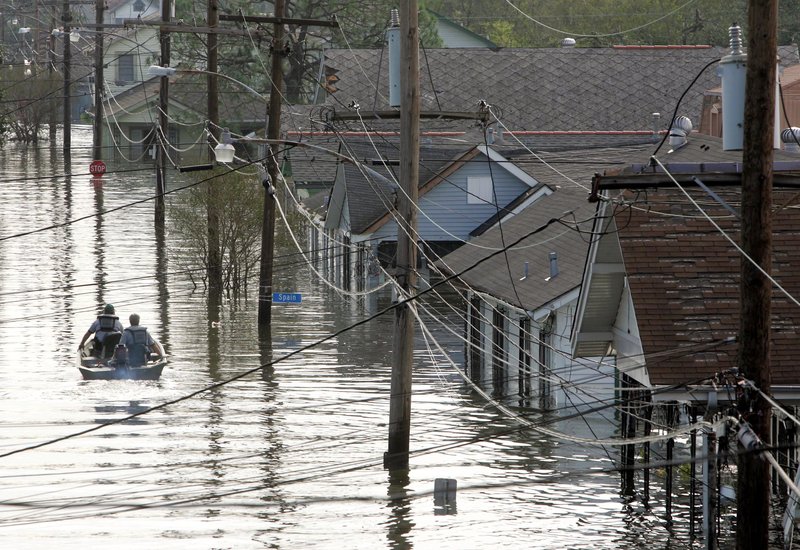OCEAN CITY, Md. -- For millions of Americans living in the hurricane zones on the Gulf and East coasts, recent decades have been quiet -- maybe too quiet.
Cities like Tampa, Fla., Houston; Jacksonville, Fla., and Daytona Beach, Fla., historically get hit with major hurricanes every 20 to 40 years, according to meteorologists. But those same places have now gone at least 70 years without getting smacked by those monster storms, according to data analyses by an MIT hurricane professor and The Associated Press.
These are places where people may think they know what to expect from a major hurricane -- with more than 110 mph winds, such as Katrina or Andrew -- but they really don't. They are cities where building construction has boomed but that haven't been tested by nature at its strongest. In the Tampa region, an Andrew-sized storm could cause more than $200 billion in damage, according to a local government study in 2010.
Few of Tampa's current residents witnessed the last major hurricane that hit there in October 1921. For northeast Florida and southern Georgia, the last major hurricane was sometime in the 19th century.
"We've been kind of lucky," said MIT meteorology professor Kerry Emanuel, who along with the AP, crunched numbers on how often hurricanes have hit metro regions and compared them with the last time they were hit. "It's ripe for disaster. ... Everyone's forgotten what it's like."
"It's just the laws of statistics," said Emanuel. "Luck will run out. It's just a question of when."
This hurricane season, beginning today, doesn't look to be as busy as past ones. The National Oceanic and Atmospheric Administration forecasts a 70 percent chance of fewer-than-normal hurricanes, mostly because of an El Nino weather oscillation.
But even a quiet season can have one devastating storm hit. That's what happened when Andrew smashed parts of Miami in 1992; it was the second costliest hurricane on record.
Craig Fugate, administrator of the Federal Emergency Management Agency, is preparing for the worst and worrying that other people aren't.
Inexperienced people "generally underestimate how bad it will be and [make] decisions about staying when they should be evacuating," Fugate said. "You have to accept the fact that every time a major storm threatens it's a new experience for 99 percent of the people involved."
Only one hurricane-prone state, Louisiana, has a governor who was in office when a major hurricane hit. The FEMA top management is different than in 2005, when the last majors hit.
Fugate, who was Florida's emergency management chief during many state landfalls in 2004 and 2005, said "there are very, very few people who are working state government in Florida who were there in state government in 2004."
Experts are especially worried about the Tampa region. Emanuel calculates using past storm data and computer simulations that a major hurricane in general should hit Tampa every quarter century or so. The National Hurricane Center says a major hurricane should hit every 30 years or so. But it's been decades upon decades since the big one hit.
It may sound like areas like Tampa are "overdue," but scientists say that's not a good word because the odds of getting hit don't actually change because there were no storms the year before.
"Hurricanes don't give a darn what happened the last year, the last 10 years," Christopher Landsea, science operations officer at the National Hurricane Center in Miami, said. "We could certainly have a major hurricane hit Tampa-St. Pete in 2015, but it doesn't matter for this particular season that it hasn't had a hurricane since 1921."
For Houston, the last major hurricane hit was 1941, according to the hurricane center.
"I would be seriously worried about Houston, just because it's a huge petrochemical center with very large potential for a blended natural-technological event," said Kathleen Tierney, director of the Natural Hazards Center at the University of Colorado.
For Ocean City, Md., and down the coast at Norfolk, Va., it's been more than 160 years since they've been hit by a major hurricane. And while geography and currents make landfalls there rarer than Florida, it can happen and probably will someday, experts said.
It has been more than nine years since the U.S. was struck by a major hurricane -- Superstorm Sandy did major damage but didn't qualify meteorologically as a major hurricane. That's a streak that is so unprecedented that NASA climate scientist Timothy Hall went looking to see if it could be explained by something that was happening with the weather or climate.
He found that big storms formed, they just didn't hit America, coming close and hitting islands in the Caribbean and Mexico. The lack of hurricanes hitting the U.S. "is a matter of luck," Hall concluded in a peer-reviewed study.
A Section on 06/01/2015
